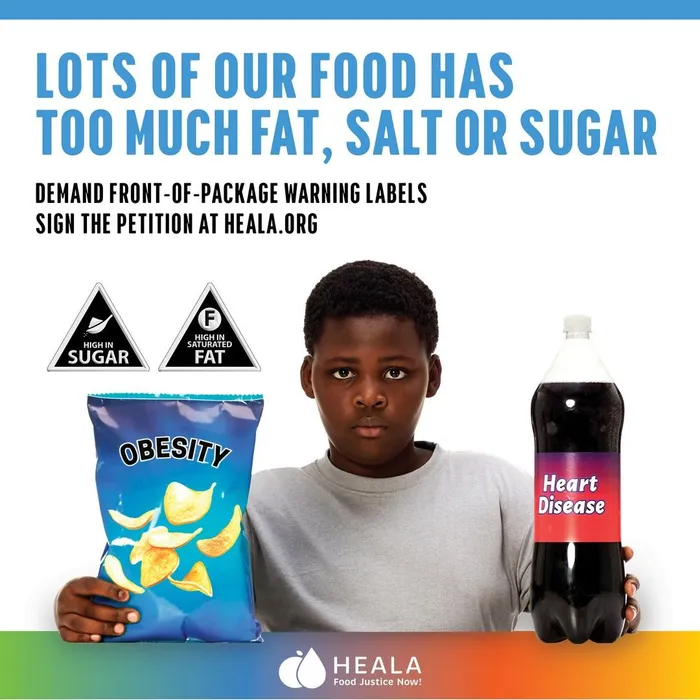Put a label on it: Call grows to expose junk food threat to SA kids

The Healthy Living Alliance (HEALA) is sounding the alarm on a silent but deadly threat to children’s well-being - unhealthy packaged food.
Image: Supplied
AS SOUTH Africa observes National Child Protection Week from May 29 to June 5, the Healthy Living Alliance (HEALA) is sounding the alarm on a silent but deadly threat to children’s well-being - unhealthy packaged food. The organisation is urging the Department of Health to implement long-delayed mandatory front-of-package warning labels (FoPWL) to help stem the tide of childhood obesity.
Supermarket aisles across the country are lined with bright packaging and cartoon characters marketing sugar-laden cereals, salty snacks, and fatty processed meals directly to children. These foods, HEALA warns, are key contributors to the growing childhood obesity epidemic in South Africa, where obesity rates among children have surged from 1 in 20 to 1 in 8 over the past decade. If this trend continues unchecked, more than four million South African children aged 5 to 19 could be affected by obesity by 2031, placing the country among the 10 worst-affected nations globally.
“This is a matter of child protection,” says Zukiswa Zimela, HEALA’s communications manager. “Children are highly vulnerable to packaged food that is often harmful to their health. Parents are trying to make good choices, but without clear, visible warnings, they’re set up to fail. We can’t afford to continue this way.”
Mandatory warning labels
HEALA’s proposed solution is simple but effective: introduce bold, mandatory warning labels that clearly flag when a product is high in sugar, salt, saturated fats or contains artificial sweeteners. The group points to successes in countries like Chile, Mexico, and Argentina, where such warning labels have already helped change consumer behaviour, limit child-targeted advertising of unhealthy food, and even prompted manufacturers to reformulate products to be healthier.
“It works. And it’s time we did the same here in South Africa,” says Nzama Mbalati, CEO of HEALA. “The World Health Organization recommends front-of-package labels as a best-buy public health intervention. These labels are most effective when they are mandatory, interpretive and easy to understand - especially for children and people with lower literacy levels. The science is clear. We have the evidence. What we don’t have is the political will to act.”
South Africa’s own draft regulations (R3337), published in April 2023, include proposals for such warning labels. Despite overwhelming public support and widespread concern about the country’s health crisis, the regulations remain unfinalised. By February 2024 - six months after the public comment period closed - the submissions had yet to be reviewed. According to a former Department of Health official, the regulations were internally “shot down” for undisclosed reasons. Observers suspect pressure from the food industry is behind the delay.
“Meanwhile, children are getting sicker,” warns Mbalati. “They’re being set up for a lifetime of health complications like diabetes, high blood pressure, and heart disease because there is no protection in place to limit their daily exposure to harmful food.”
Not just a health issue
Experts agree that this is not just a health issue, but a rights issue. “Research shows that front-of-package warning labels are not only a proven way to reduce the consumption of unhealthy foods but are also fundamental to protecting the constitutional right to health for every child in South Africa,” says Yolanda Tarisayi Radu, senior researcher for Law and Policy at PRICELESS SA. “Clear and visible labels empower families to make healthier choices and hold food manufacturers accountable. Implementing mandatory front-of-package labelling is an urgent step towards fulfilling our obligation to safeguard the health of every child.”
HEALA has dismissed voluntary and non-interpretive labelling systems as ineffective. These approaches, often used by industry to avoid stricter regulations, are frequently confusing and easily manipulated by manufacturers. “That’s why we need mandatory warning labels. We cannot allow food companies to keep putting profits before people’s health,” says Zimela.
A South African study that tested three types of front-of-package labels - Guideline Daily Amounts (GDA), traffic light labels, and warning triangles - found the warning triangle to be most effective. GDA labels were the most confusing, and while the traffic light system had some benefit, it often sent mixed signals when a product displayed both red and green markers. The warning triangle, however, was nearly twice as effective as GDA in helping consumers identify unhealthy food and discouraging purchase.
'Health before profits'
“This Child Protection Week, we’re reminding South Africans that child safety doesn’t stop at physical abuse or neglect,” says Mbalati. “It extends to the everyday harm caused by unchecked access to foods that are damaging their health. Protecting children means giving them a fair chance at a healthy life. It means standing up to corporate power and putting health before profits. It means acting now, before more children are harmed.”
HEALA is calling on civil society, health-care professionals, educators, parents, and concerned citizens to join the movement and demand swift action from policymakers. With strong public backing and mounting scientific evidence, the time to act is now.
“Let’s not wait until another generation suffers the consequences,” concludes Mbalati. “The path to a healthier future starts with a label - and the political courage to put children’s well-being first.”
Related Topics: